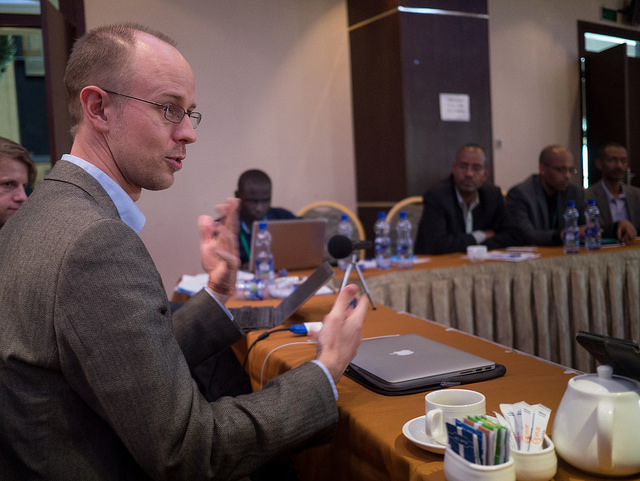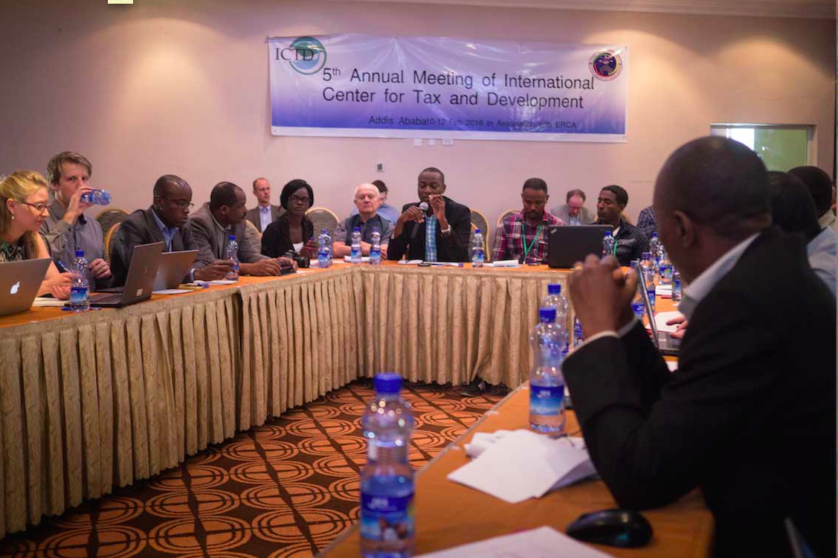It is widely recognised that property taxation is the most viable, efficient, and progressive means of raising local government revenue, with significant positive implications for state-building and public accountability. However, property tax collection remains very low in the developing world, and academic research on the topic is limited. For these reasons, the ICTD decided to host a day-long roundtable discussion on the issue on February 13th, in order to share experiences and insights, and identify productive avenues for future collaborative research. Around 40 people, representing academic institutions, consultancies, revenue authorities, donor agencies, and non-profit organisations, attended the meeting. The day was organised into five sessions, each tackling an important question about how to strengthen property tax collection in developing countries.
1. What are appropriate property valuation systems in developing country contexts?
The two main methods of valuation are value-based and area-based assessments. While value-based assessment is more accurate, it requires expertise, market transaction benchmarks, and is more expensive, time-consuming, and difficult for people to understand. Area-based assessment on the other hand is much easier to explain and administer, but is regressive. Thus, there is a real trade-off between ease of implementation and equity concerns.
Paul Fish, a chartered surveyor with the Revenue Development Foundation, presented a points-based valuation system, which helps minimise these trade-offs. It does this by adding points for attractive features of a building (such as having access to a paved road, having a well, drainage, or air conditioning) and deducting points for poor features (such as no access to electricity, poor location, or bad roof and wall condition). This method is simpler than the value-based system, but more precise, and thus less regressive, than the area-based system.
Samuel Jibao from the CERCB in Sierra Leone brought attention to the distinction between perceiving property tax as a tax on personal wealth versus a tax on benefits provided by the government. This is important because it has implications for the legitimacy of the tax. For example, in many rural settings, the government has not provided things like access to electricity or clean water. Citizens who provide these things for themselves by digging a well or buying a generator often feel that it is unfair for the government to then tax them more for having these things. They feel that it would be more legitimate to tax properties based on benefit factors, such as access to a health centre or a paved road.
This is why it is crucial for property tax initiatives to include a strong sensitisation component. By engaging with citizens through radio programs, town halls, billboards, local newspapers, or street theatre, local governments can explain that with the funds from property taxes, they will be able to provide more benefits, as well as explaining and justifying the system by which valuations are reached. This is a great strength of the points-based system, because it is easy to understand how the value was reached, while accounting for additional factors that add or deduct value beyond just the property size.
2. What are appropriate IT systems for property taxation in developing country contexts?
While technology cannot solve all problems, this has been the point of failure of many initiatives, and is thus important to consider carefully. In low capacity environments, it is necessary for IT systems to be comprehensive, affordable, user-friendly, sustainable, and amenable for transparency. Wilson Prichard, Research Director of ICTD presented three procurement options: international software packages, in-house development, or local private sector solutions. While international packages are expensive and can be difficult to use, in-house solutions face sustainability problems, as there may not be anyone on hand in the future to fix or update the system. Local, private development may be preferable because it can be customised to local conditions, and local firms have strong financial incentives to provide continuing technical support in an affordable, hands-on, and timely manner.
Still, it seemed nonsensical to the group to have multiple systems developed in each country, when all the governments have a common need. Ideally, there would be an open-source solution available, which governments could have local firms customise and support in the long-term. Paul Fish offered the RDF’s ReMoP system, which is free and open-source, and has been implemented by local councils in Sierra Leone and Malawi. He suggested that this solution could be shared through ATAF to local government associations or ministries. Still, the group acknowledged that even perfect valuation and IT systems cannot overcome the political challenges to property taxation.

3. What are the major political barriers to property tax collection and how can these be overcome?
Because property taxation can be very progressive, and thus most affects the wealthy, it often faces resistance from the economic and political elite. This can take the form of refusing to implement property tax initiatives as public officials, sabotaging them, using personal influence to be excluded from the cadastre, or otherwise avoid compliance as private citizens.
In contexts where political support is highly dependent on ethnicity and region, elite incentives diverge: in ruling party areas, power holders expect transfers from central government and so won’t want to raise property taxes, while in opposition areas,local governments might try to raise as much as they can because they don’t feel they can depend on the central government and seek autonomy. In instances where there is little interest in collecting property taxes, elites must be convinced that there will be a political payoff from collecting the taxes and then delivering popular public services.
This underscores the importance of property taxes being seen as legitimate. While it may be easier to convince low or average income-earners of the benefits of such a progressive tax, it is more difficult to convince those whose wealth will be redistributed. However, it is possible if long-term public benefits are emphasised. For example, William Attwell from Oxford Analytica presented the example of Special Rating Areas in Cape Town, where business and property owners were convinced to pay an additional rate on property in exchange for extra public support to upgrade the area and attract more business.
In countries where traditional authorities hold sway, they might not want to legitimate a new authority in the local government. In Sierra Leone for example, one paramount chief instructed his people not to pay property tax. However, in another area, the district council chairman brought the chiefs into council in order to get them on side for the property tax reform. Thus, it is crucial to take traditional power holders into consideration, and bring them on board.
Finally, resistance to property taxes does not only come from the elite, but can be very unpopular among the general population. Histories of colonialism, conflict, and land reform create contexts in which people are sensitive about their rights to land, may lack trust in government, and are suspicious of officials assessing their homes and assets. Olly Owen from the Oxford Department of International Development shared the example of Nigeria, where some ethnic groups feel they belong to the land, and that having to pay tax on it is a kind of victimisation. This again points to the necessity for comprehensive sensitisation programs, to ensure that property taxation is clearly understood and seen as legitimate.
4. Should responsibility for property taxation lie at the local government or national level?
Given significant technical and political barriers to the local government level, some governments have centralised property taxation, granting national revenue authorities the responsibility for collection. For example, in Ethiopia, ERCA is collecting property tax in Addis Ababa, and in Rwanda, the RRA is collecting all property taxes. The arguments for this centre around the stronger capacity of the revenue authorities, and their ability to more effectively and perhaps less corruptly, collect increased revenue. However, there is limited evidence that revenue authorities have in fact increased collection from property taxation more than local governments could, and there are significant drawbacks.
To begin with, centralising collection interferes with efforts to build capacity at the local government level in the context of decentralisation. It also undermines the ability for property taxation to build positive accountability relationships between taxpayers and their local governments. Further, central agencies may be successful in collecting property taxes in capital cities, but it is doubtful that they can effectively assess and collect property taxes across the countryside, where local governments have more finely-grained knowledge and are better able to reach people. Finally, delinking the functional responsibility from the political responsibility for property taxation may confuse citizens about who does what, as well as distracting from the core mission of central revenue authorities.
Of course, there are other options for allocating property taxation responsibilities. For example, the central revenue authority could manage assessments, while local governments could carry out collection. Alternatively, local governments could contract out property taxation to a private firm. However, Sierra Leone’s experience with outsourcing is cautionary, as the agency was very coercive and antagonised the population, which only served to undermine the legitimacy of property taxation and the government.
Another option, presented by Henry Saka of the Uganda Revenue Authority, is for local and central governments to collaborate on taxation. Recently, the URA and local governments have been working together and leveraging each other’s strengths to promote mutual enforcement of taxes. For instance, if the URA is taxing a company with a branch in another city, it will enquire about whether the company is paying its local taxes there. By the same token, if the local government is taxing a company, it will enquire about its VAT payments. Currently, the URA is even considering having local governments collect some central taxes because they can reach people better, for which the central government would pay a collection fee as well as providing capacity building support to local governments.
Overall, the group seemed to agree that complete centralisation of property taxes may not be desirable, especially as a temporary measure, but that further research about the impacts of shifting various responsibilities across the levels of government would be useful for informing future decisions.
5. Should land titling and property taxation initiatives be linked?
This discussion was motivated by the experiences of DAI, which found that land titling initiatives had limited success when implemented on their own. There are reasons to believe that governments would more aggressively and sustainably pursue land titling if it was linked to revenue collection, and that because effective property taxation relies on the existence of an updated cadastre, these two reform areas should be pursued together.
Discussion participants raised some interesting points about the relationship between property titling and taxation. In some contexts, like slums in Latin America, citizens have demanded formalisation of their dwellings and rights to land in order to achieve access to credit and existential security. In others, like Rwanda, titles were offered without any efforts to value the property, because it was felt that otherwise, people would not cooperate for fear of subsequently being taxed. In some places, people are eager to pay property taxes because this is taken as evidence of ownership, while in others, governments are at pains to explain that paying the tax does not give you the title to the land.
At the same time, land titling can be very complex and challenging. Across Africa, there are various claims to land ownership: from state ownership, to formal titles, and customary use rights. Inheritance also complicates matters, as land gets subdivided into smaller and smaller parcels and many family members may have interest in the same building. Along with the danger that tying titling to taxation might scare people away from cooperating, these factors call into question the rationale of titling as the best place to start. Still, much remains to be deliberated and evidenced on this question.
For more information on property taxation in Africa, please have a look at “How Property Tax Would Benefit Africa“, an African Research Institute (ARI) publication, written by ICTD CEO Prof Mick Moore and ATAF Research Director, Nara Monkam. See also the African Property Tax Initiative.



